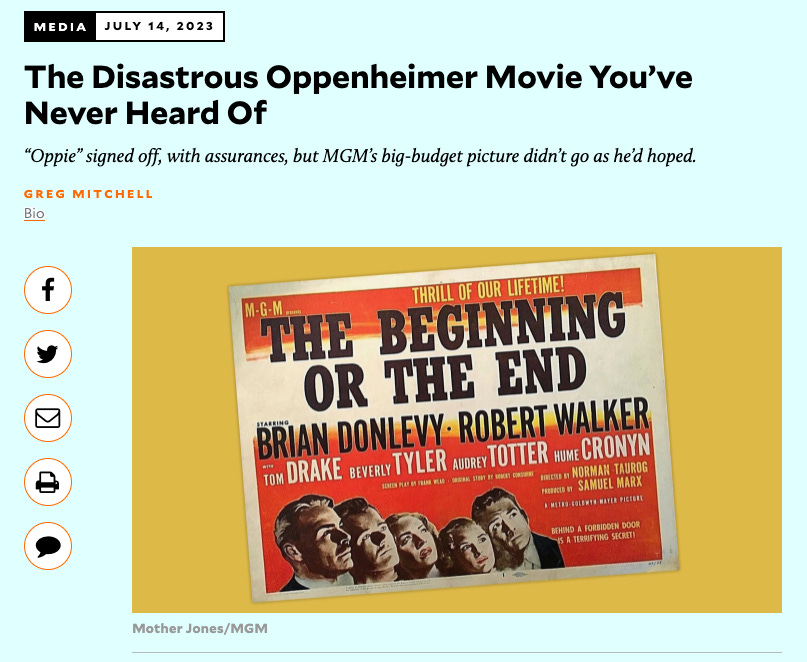When Oppenheimer Signed Off on Bogus Film (as FBI Bugged Him)
Plus: New 5-minute teaser, but actors' strike hurts promo.
Greg Mitchell is the author of a dozen books (including Hiroshima in America, Atomic Cover-up and The Beginning or the End, and has directed three documentary films since 2021, two for PBS.
Welcome to day #2 of this daily, bloggy, newsletter, and a hearty thank you the large number who subscribed yesterday and others who hailed this effort on social media. As I noted yesterday, I’ll be covering “the man, the movie, The Bomb, and me.” I did love the tweet by longtime Washington Post writer Dan Froomkin: “An expert will be truth-squadding Oppenheimer and its coverage in real time.” But I’ll be doing more than that….
Here are today’s fun items….If you have not subscribed, you can do so now, it’s free, and with bonus that it will not clog your email box for long as it will probably expire in another month or so….
_____
My promised piece for Mother Jones has just been posted, that’s the lead graphic above. It’s related to my book The Beginning or the End, about the first movie drama from Hollywood about the atomic bomb, which featured Robert Oppenheimer as a key figure after he signed off on a script full of falsehoods. Coming Monday is my piece at LitHub on Ayn Rand and her interviews with Oppie for her rival movie….Here’s an excerpt from today’s MoJo piece:
As the project progressed, studio co-founder Louis B. Mayer called it the “most important” movie he would ever produce. But in the year that followed, the intended message took a U-turn. Major—sometimes unintentionally comical—falsehoods were introduced into the script to such an extent that the final product would be little more than pro-bomb propaganda. President Harry S. Truman and Gen. Groves, both of whom were granted script approval, ordered dozens of cuts and revisions. Truman even forced a costly re-take and had the actor playing him fired.
More troubling for MGM executives, the studio had to convince the scientists portrayed in the film to sign releases granting their permission. Producers tried for months to get Albert Einstein, Leo Szilard, and Oppenheimer to sign off, while promising them (unlike Groves) no fee. These early efforts were to no avail, and no wonder. MGM was so anxious to please Washington that it allowed outrageous fictionalizations: The Japanese, in one iteration, were on the verge of developing their own bomb—in Hiroshima, no less. An American scientist received a fatal dose of radiation while arming the Hiroshima bomb and later reappeared as a ghost, assuring his wife that our nuclear future was “so bright.” Hiroshima was showered with warning leaflets before the bomb was dropped. The Enola Gay was met by enemy fire over Japan while shuttling its payload of death.. And none of the scripts mentioned Nagasaki.
Einstein and Szilard eventually signed off, despite their qualms, but the ever-conflicted Oppenheimer resisted. Prepared for the worst, MGM changed his name in one version to the implausibly WASP-y “Whittier.”
I’ve written two previous pieces for Mother Jones on this subject: on President Truman’s interference on the MGM film, and on how top officials managed to soften the impact of John Hersey famous “Hiroshima” article.
_____
Flash forward: The Nolan movie is now opening in less than a week, and tomorrow I’ll be sitting in a Manhattan hotel theater watching an early screening. Nolan is supposed to be there on a panel afterward and I guess the new actors strike won't prevent that. But yesterday, his top cast, in London for the gala premiere there, all exited the minute the SAG/AFTRA strike notice went up. Nolan said they left to “write their picket” signs.
So no more promo by the actors before the opening here unless strike settled? Well, there’s been plenty of coverage and hype to date, and plenty more in the can, so they may not be missed much, especially if early reviews continue to be very good. But here’s a new Hollywood Reporter interview with the cast.
_____
Not skipping a beat in promo, the studio released yesterday this longest preview of the movie yet, a five-minute set of extracts. Frankly, I had trouble making out much of the dialogue, especially in a couple of key places, due to the soaring music. Probably the mix in the movie itself is better.
_____
Bertrand Russell on “The Mind of Oppenheimer,” 1955….Elie Wiesel on Oppie, 1959
_____
Young Bobby Dylan in first TV rendition on his “Hard Rain.”




